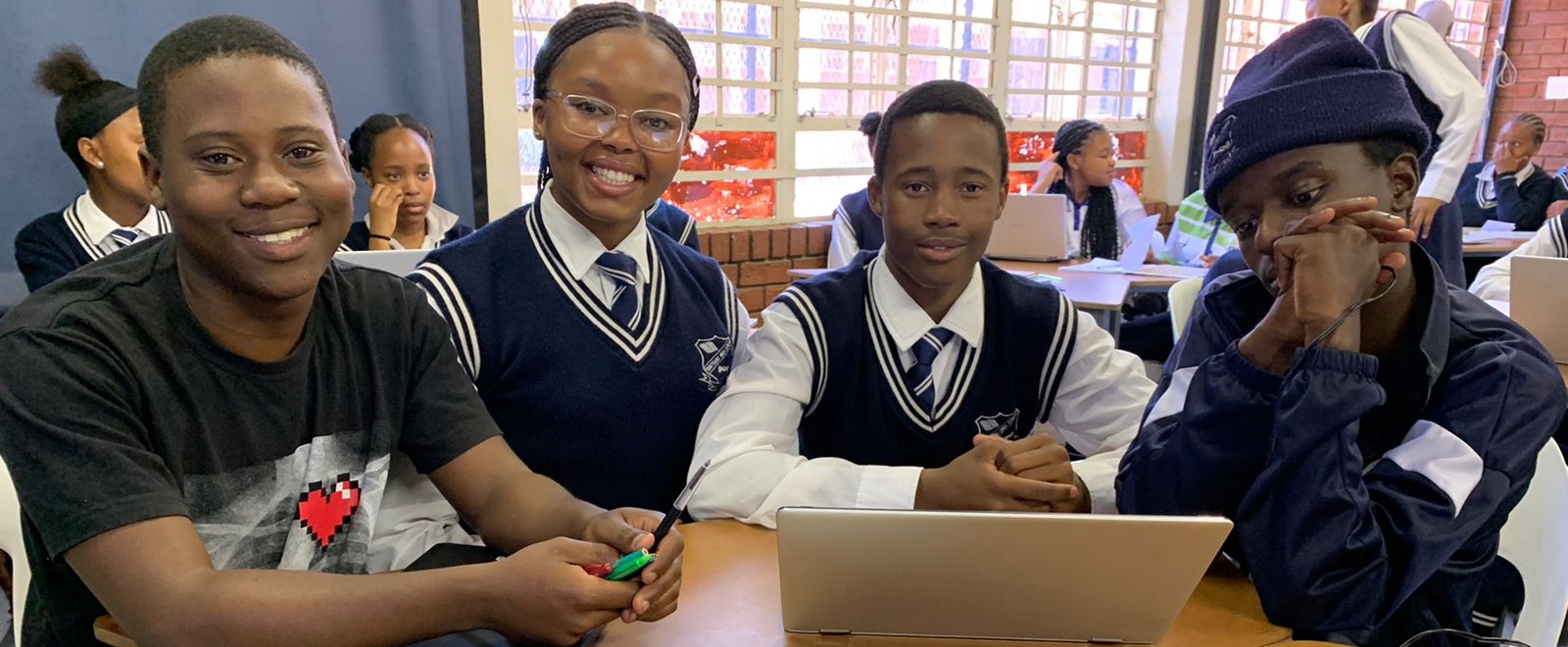Nearly 900 learners who have passion for coding and robotics are set to graduate
Caption:
Future technopreneurs who recently completed a
Telkom-sponsored coding and robotics course
📷 SUPPLIED
Two 16-year olds, Mpho Majola and Kgomotso Mokoena, are a new breed of young South Africans who are determined to hone new skills to boost their chances of finding high-paying jobs or starting businesses that generate wealth and employment.
The teenagers from Tiisetsang High School, have recently completed a Telkom-sponsored Coding and Robotics programme, which they see as the beginning of their journey to equip themselves with skills that will help them to get ahead in life.
Majola and Mokoena are among close to 900 learners from four high schools including Tiisetsang and Kgolathuto in the Free State and Qhubulwazi and Methula in Mpumalanga, who completed the three-year programme.
The programme taught the learners how to transform their ideas into real tech products using a combination of design thinking, coding, teamwork, and business acumen. The learners will officially graduate this month with certifications in IBM and IC3-backed courses, having acquired valuable knowledge in coding, robotics, digital literacy, and business innovation.
Judy Vilakazi, head of the Telkom Foundation, points out that the programme is designed to stimulate technopreneurship.
“Technopreneurship is a new breed of entrepreneurship. We’ve structured our programme such that we can build technopreneurs from the ground up,” says Vilakazi.
Majola, who dreams of becoming a software developer and tech entrepreneur, believes the programme will help him find a job or start his own business, thereby avoid being unemployed or unemployable - a major problem that afflicts millions of young South Africans.
“With the increase in demand for tech-savvy individuals, I think the skills I have learned from the programme will make me attractive in the job market. Through this programme, I've learned programming languages like CSS, JavaScript and I have also learned coding in Scratch and Robotics,” says Majola.
Mokoena also shares Majola’s sentiments about the programme.
She is interested in studying data analytics, coding, web programming, and software engineering, which she hopes to use as a springboard to pursue a career as a software engineer. She too dreams of becoming a technopreneur.
“I plan to create a better life for myself and employment for young people in the technology field,” reveals Mokoena.
The Coding and Robotics programme that Majola and Mokoena completed entails a technopreneurship module, a dynamic, hands-on course that empowers learners to master technology and to innovate with it.
The course allows them to rotate through industry roles such as developer, designer, and project manager, culminating in the creation of a functional prototype that the learners pitch to a panel of “investors” in a simulated entrepreneurial setting.
This unique learning experience is nurturing a new generation of confident, creative problem-solvers—learners who can imagine, design, and build solutions that respond to challenges in their communities.
“The growth we’ve seen in these learners—both technical and personal—has been truly remarkable. They’ve evolved into problem-solvers who work collaboratively, think critically, and imagine boldly. This is exactly what the Telkom Foundation was created to support,” explains Vilakazi.
Any country that wants to grow its economy, attract investment, and become globally competitive requires computer engineers to produce software programmes and hardware machines; research scientists to find new cures for diseases; civil engineers to build roads, trains, airports, and ports; and engineers to build robots to automate laborious work.
These rare skills, known as science, technology, engineering and mathematics (STEM) professions, are in short supply in South Africa and the government has been encouraging school-leavers to take them up. Employers such as banks, insurers and telecoms, IT and construction companies are constantly looking to hire STEM graduates.
The shortage of STEM graduates and artisans is often cited by economists as a serious economic growth bottleneck and the reason why South Africa has one of the highest unemployment rates in the world.
Nearly 12-million South Africans are unemployed, mostly young, discouraged black jobseekers who do not have the skills needed by employers. Many of these young adults are trapped in prolonged adolescence in which they remain dependent on their parents late into adulthood.
STEM professionals including computer engineers are highly sought after and are also among highly-paid professionals. In 2021, personal finance company Bankrate released a study of 159 college degrees in the US that found that STEM degrees are most valuable to those who earn them, while arts and music-related degrees are least valuable. The top 25 earning graduates in the list majored in STEM subjects, while the bottom 10 in the list held arts degrees.
Architectural engineering graduates earned $90,000 annually on average, and only 1.3% were unemployed. Graduates who majored in construction services took home $80,000 and only 1% of them were jobless. Computer engineering graduates earned $101,000 a year and 2.3% were unemployed.
At the bottom of the list, at 159th spot, were holders of visual and performing arts degrees, who earned an average of $35,500 and 3.6% were unemployed. Fine arts graduates came in at 158, earned $38,000 and 5.6% couldn’t find work.
Other low-ranking degrees were drama and theatre, ranked 157th, and the holders earned $41,000 annually, while video, film and photographic arts graduates were ranked 150th and earned $43,000 on average.


